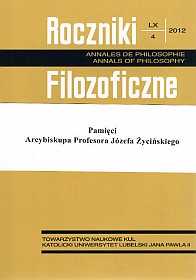Inne umysły
Abstrakt
In presented paper we consider the problem of knowledge of other minds. We develop a systematic argument against this theory that has come to known as argument from analogy. We look to the philosophical and psychological ideas whose meaning boils down to the claim that meta-cognitive processes so critical for self-awareness, self-knowledge emerge and develop in a strong connection with the process of attribution of mental states to others. We spin in one position some philosophical traditions, dating historically from Augustine, Descartes to Strawson and Davidson. Then, we combine philosophical discourse with the findings provided in developmental psychology, which show that children’s attributions of their own mental states emerge in a strong correlation with the attribution of mental states to others. Next, we combine those psychological findings with philosophical discussion of the conceptual conditions for the attribution of mental states. At the same time, we show that a key issue in the design of an argument against the theory which recognizes the primacy of the first person or uses in some sense the argument from analogy in solving the problem of other minds, is to refer to cognitive conditions for the acquisition of language and its functioning which we find historically in Descartes’ works and recently in works of cognitive psychologists.
Bibliografia
Apperly I., Mindreaders. The Cognitive basis of Theory of Mind, Psychology Press, 2011.
Astington J.W., The Future of Theory of Mind Research: Understanding Motivational States, the Role of Language, and Real-World Consequences, „Child Development”, 72 (2001), s. 685-687.
Augustyn, De Trinitate, VIII, VI, 9, tł. M. Stokowska, Kraków 1996, s. 273-274
Avramides A., Other Minds, London 2001.
Baier A., Kartezjańskie osoby, tł. M. Szuster [w:] J. Górnicka-Kalinowska (red.), Filozofia podmiotu, Warszawa 2001, s. 58.
Białecka-Pikul M., Co dzieci wiedzą o umyśle i myśleniu?, Kraków 2002.
Bloom P., How Children Learn the Meaning of Words, Cambridge 2000.
Carruthers P., How we know our own minds: The relationship between mindreading and metacognition, „Behavioral and Brain Sciences” 32 (2009), s. 1–62.
Chomsky N., Language and Mind, New York 1972, s. 11..
Cottingham J., Cartesian reflections, Oxford 2008, s. 107-128.
Davidson D., Myśl i mowa, tł. B. Stanosz, [w:] B. Stanosz (red.), Język w świetle nauki, Warszawa 1980, s. 340-362.
Davidson D., Zwierzęta racjonalne, tł. C. Cieśliński, [w:] D. Davidson, Eseje o prawdzie, języku i umyśle, Warszawa 1992, s. 234-250.
Evans G., The Varieties of Reference, Oxford 1982
Frith U., Happe F., Theory of mind and self-consciousness: What is it like to beautistic? „Mind and Language” 14 (1999), s. 1–22.
Gopnik A., A. N. Meltzoff, Words, thoughts, and theories, Cambridge(1996); D. Wegner, The illusion of conscious will, London 2002.
Gopnik A., Meltzoff A. N. Words, Thoughts, and Theories, London 1996, s. 179–180.
Gopnik A., Meltzoff A. N., Kuhl P. K., Naukowiec w kołysce, tł. E. Haman, P. Jackowski, Poznań 2004, s. 61.
Gopnik A., The illusion of first-person knowledge of intentionality, „Behavioral and Brain Sciences” 16 (1993), s. 1–14.
Gopnik A., The illusion of first-person knowledge of intentionality, „Behavioral and Brain Sciences”, 16, (1993), s. 1–14.
Góméz J. C., Some thoughts about the evolution of LADS, with special reference to TOM and SAM, [w:] P. Carruthers, J. Boucher (eds.), Language and thought, Cambridge, s. 76-93.
Griffin D.R., Umysły zwierząt. Czy zwierzęta mają świadomość?, tł.. M. Ślosarska, A. Tabaczyńska, Gdańsk 2004.
Gut A. O treści i nabywaniu pojęcia przekonania (Od testów fałszywego przekonania do testów na intensjonalność), [w:] Pojęcia, red. J. Bremer, A. Chuderski, Kraków, 2012, s.111-138.
Gut A., Kognitywne podstawy komunikacji, „Przegląd Filozoficzny” 2010, nr 3 (75), s. 331-337.
Gut A., Samoświadomość, dialog, mowa wewnętrzna oraz inne umysły, [w:] Ja- dialogowe red. P. Oleś, M. Puchalska-Wasyl Warszawa, 2011, s. 325-360.
Haman M. (1992), Dziecięca teoria umysłu jako podstawa porozumiewania się, [w:] B. Bokus, M. Haman (red.), Z badań nad kompetencją komunikacyjną dzieci, Warszawa, 1992, s. 229-251.
Ingarden R., O poznawaniu cudzych stanów psychicznych, [w:] tenże, U podstaw teorii poznania, Warszawa, 1970, s. 410.
Judycki S., Intersubiektywność i czas. Przyczynek do dyskusji nad późną fazą poglądów Edmunda Husserla, Lublin 1990, s. 247-273.
Kartezjusz, Medytacje o pierwszej filozofii wraz z zarzutami uczonych mężów i dopowiedziami autora, tł. M. i K. Ajdukiewiczowie, S. Swieżawski, Warszawa 1958, t. I, s. 40.
Kartezjusz, Rozprawa o metodzie, tł. W. Wojciechowska, Warszawa 1981.
Kartezjusz, Zarzuty i odpowiedzi późniejsze. Korespondencja z Hyperaspistesem, Arnauldem, More’em, tł. J. Kopania, Kęty 2005, s. 61
Kopania J., Descartes i Kant o użyteczności poznawczej języka naturalnego, Warszawa 1996.
Malle B.F., The relation between language and theory of mind in development and evolution, [w:] T. Givon, B.F. Malle eds., The evolution of language out of pre-language, Amsterdam: 2002, s. 265-284.
Merlau-Ponty M., Fenomenologia percepcji, Warszawa 2001.
Mitchell P., Acquiring a conception of mind: A review of psychological research and theory, Hove 1996.
Perner J., Understanding the representational mind, Cambridge 1991.
Perner J., Understanding the representational mind, Cambridge 1991.
Scheler M., Istota i i formy sympatii, tł. A. Węgrzecki, Warszawa 1980, s. 319-394.
Stępień A.B., Rodzaje bezpośredniego poznania, [w:] tenże, Studia i szkice filozoficzne, Lublin, 1999, s.140-143.
Strawson P. F., Osoby, tł. B. Chwedeńczuk, [w:] J. Górnicka-Kalinowska (red.), Filozofia podmiotu, Warszawa 2001, s. 13–40.
Taylor M., Rozwój poznania społecznego z perspektywy teorii umysłu, [w:] B. Bokus, G. Shugar (red.) Psychologia języka dziecka, Gdańsk 2007, s. 268-308.
Villiers J. de, Villiers P.A. de, Linguistic determinism and the understanding of false beliefs, [w:] P. Mitchell, K. Riggs (eds.), Childern Reasoning and the mind, Hove 2000, s. 191-228.
Wallis M., Wyraz i życie psychiczne, [w:] tenże Przeżycie i wartość, Kraków, 1969, s. 106-171.
Wellman H. M., The Child’s theory of mind, Cambridge 1990.
Węgrzecki A., O poznawaniu drugiego człowieka, Kraków 1992.
Copyright (c) 2012 Roczniki Filozoficzne

Utwór dostępny jest na licencji Creative Commons Uznanie autorstwa – Użycie niekomercyjne – Bez utworów zależnych 4.0 Międzynarodowe.





